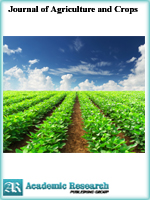Journal of Agriculture and Crops
Online ISSN: 2412-6381
Print ISSN: 2413-886X
Print ISSN: 2413-886X
Quarterly Published (4 Issues Per Year)

Archives
Volume 2 Number 7 July 2016
Effects of Food Safety and Food Security on the Economic Transformation of Nigeria
Authors: Osundahunsi O.F. ; Abu T. F.A. ; Enujiugha V. N.
Pages: 62-82
Abstract
Food safety and food security is a determinant of the well-being of the citizens of a country and how it translates to the development and transformation of the economy in a country specifically Nigeria was critically examined. Recent FAO figures indicate that over 60% of the world undernourished people live in Asia, and a quarter in Africa. Also there are 22 countries, 16 of which are in Africa, in which the undernourishment prevalence rate is over 35%. Hunger, food insecurity (chronic or transitory), malnutrition involving micronutrient malnutrition (MNM) and protein energy malnutrition (PEM) are some of the issues arising from food insecurity. Lack or absence of minerals and vitamins like Iodine, Iron and Vitamin A affects the growth and development of humans. The study revealed that several factors contributing to food insecurity includes wars, natural disasters, unemployment inadequate technological deployment and high post-harvest losses. Steps were taken to examine how agriculture contributes to food security, effects of various policies by past and present government on the food security and food safety situation in Nigeria. Also the emerging issue in combating food insecurity especially the use of biotechnology was further explained. Useful recommendations for enhancement of food security and safety includes: reduction of post-harvest losses through proper utilisation, processing and packaging of agricultural products, food fortification and supplementation to combat micronutrient and protein energy malnutrition, increased use of biotechnology; formulation of good agricultural policies including creation of agric cooperatives and the new Nigerian Agricultural Transformation Agenda (ATA) that can lead to transformation of the economy.



